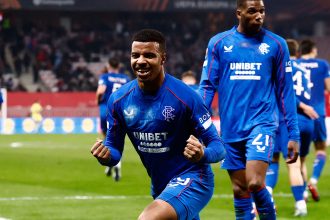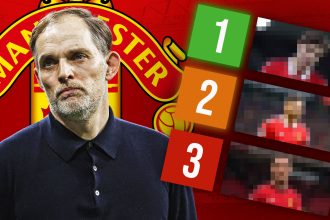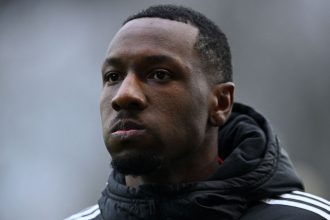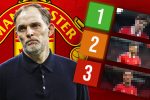With a resourceful leadership team and a growing presence in La Liga, Mallorca is charting a path back after years of instability
Pablo Ortells doesn’t get star-struck easily.
As Mallorca’s Sporting Director since 2020 – and previously in the same role at Villarreal, one of Europe’s top talent factories – the 44-year-old has played a key part in unearthing soccer’s biggest stars. He helped launch the career of 2024 Ballon d'Or winner Rodri and facilitated lucrative sales of players such as Eric Bailly, Mateo Musacchio, and Cédric Bakambu during his decade at Villarreal.
But at Mallorca, that all changed with a long-distance introduction to former NBA star and Basketball Hall of Famer Steve Nash.
“I joked after the call, ‘I just spoke with Steve Nash,’” Ortells told GOAL. “He’s a Hall of Famer – it was amazing.”
Though Ortells' role leaves little time to follow the NBA these days, he grew up watching the league and idolizing Nash, a two-time MVP with the Phoenix Suns. Nash is just one of several high-profile figures involved with Mallorca. The club’s ownership group includes four-time NBA champion coach Steve Kerr, former U.S. men’s national team star and current soccer broadcaster Stu Holden, and Suns part-owner Andy Kohlberg, a former tennis pro who serves as Mallorca’s majority owner.
For years, Mallorca struggled with instability, bouncing between La Liga and the second division. But after a turbulent decade, the club is starting to make waves among Spain’s elite. Last season they reached the Copa del Rey final, falling in a heartbreaking penalty shootout to Athletic. Now, they sit eighth in La Liga, two points adrift from sixth-placed Rayo Vallecano for the final European qualification spot.
In a league dominated by financial giants such as Real Madrid, Barcelona, and Atlético Madrid – with reported payrolls of $273 million, $201 million, and $136 million, respectively – Mallorca's success is all the more remarkable given their modest budget. Their reported collective payroll of $23.5 million ranks just above La Liga’s bottom five in spending.
“We’ve got to do what’s best for us,” Kohlberg toldGOAL. “It’s not realistic [to compete financially with the big three]. Their budgets are 10 times what ours are. The frontline [players] of Real Madrid probably make more than our entire team.”
Competing against much larger teams with vast resources – and doing so in a locale known more for its pristine beaches than being a footballing hotbed – how have Mallorca cut through? Ortells attributes much of the success to the mentality of his North American colleagues.
"That vision they have of the sport helps a lot at the time to make decisions, in particular in football and in a football club," he explained. "So we are very happy with that mentality they have. And also they have been winners in their sports, so they have been top athletes, and that's the mentality we want to build here – a winning mentality."
As Mallorca continue to defy expectations, what's the driving force behind the resurgence? GOAL takes a look.
Getty Images SportNash, Holden, and Kerr: Small but mighty team
The biggest clubs in European soccer – Real Madrid, Liverpool, Manchester City – operate like massive corporations, with hundreds of employees. And for good reason.
Real Madrid, per Forbes, is valued at $6.6 billion. Liverpool at $5.4 billion. In contrast, Mallorca, according to TransferMarkt, is worth $87 million. The club's staff is measured in dozens rather than hundreds, making every member essential – including its part-owners Holden, Nash, and Kerr.
For Holden, Mallorca is more than a financial investment. The former USMNT star, whose promising career was cut short by injuries, plays an active role in player personnel matters, advising Kohlberg and Ortells on scouting and player management. The 39-year-old sees it as a learning opportunity for a potential future in club leadership.
"That part has been fun for me, and whether that leads to something in a front office role at some point down the line… I don't know," Holden told GOAL. "I love broadcasting, I love what I do, and I just – I don't close any doors, but that part of the game [is exciting].
"I came in wanting to provide expertise in my field, but at the same time, wanting to learn and to understand what the ownership side of the game was like."
Holden’s position as a FOX broadcaster also provides Mallorca with insights into MLS. Calling dozens of domestic games a season, he researches the league extensively and maintains relationships with MLS coaches and executives. That knowledge is invaluable to Mallorca’s leadership.
"He offers an important opinion as a former player," Ortells said. "With players in MLS, he has more knowledge than us and he knows people at the clubs. He's very useful for us and we work as a team."
Though Mallorca features former MLS All-Star Cyle Larin, Ortells doesn’t expect a major influx of MLS players due to budget constraints. However, if the club continues its European push, its recruitment strategy could evolve.
"[MLS] is something that in future, we will cover," he said. "South American players years ago went directly to Europe, and now there are a lot of South American players that are going to MLS. And after MLS, they are coming to Europe. So I think it's a league the clubs [are] beginning to monitor more than 10 years ago. And in our future plans, if we continue with this stability [as a club] and continue growing, is one of the points that we have to [focus on]."
But Holden isn’t the only U.S. sports figure involved. Nash and Kerr also play key roles.
Kerr, the Golden State Warriors coach who joined Mallorca’s ownership in 2023, is still learning the nuances of soccer. Unlike Nash – who co-owns the Vancouver Whitecaps and has done punditry work in soccer – Kerr is newer to the sport. But he's a serial winner as a player and coach.
He won five titles with Michael Jordan's Bulls and Tim Duncan's Spurs, in addition to his success coaching the Warriors. Kohlberg values Kerr's experience and it helps him in evaluating various coaching decisions at Mallorca.
"I'll talk to him more about coaches and the philosophy of coaching and how our coach [Jagoba Arrasate] is doing," Kohlberg said. "He's been over two or three times and each time he's had we've had dinner with with our coach at the time, so he gives me input on that."
Nash, on the other hand, has long been passionate about soccer. He credits his youth soccer experience for shaping the court vision that made him an NBA great. His ownership experience with the Vancouver Whitecaps has also given him insight into club operations. Kohlberg says that both Nash and Kerr’s basketball experience translate to the international soccer scene.
"There are a lot of things that are similar across sports, and commonalities between basketball and soccer," he explained. "The skill set to be a great coach in basketball is pretty much the same as in soccer… The fundamentals of what makes a great player is kind of the same, identifying competitiveness..
"Do they want to be part of the team? Are they more individual? 'I wanted to score a lot of goals, or do I want to help the team win?' All that's very similar across the two sports."
With a resourceful leadership team and a growing presence in La Liga, Mallorca is charting a path back to prominence after years of instability.
AdvertisementGetty Images Sport'Playing on a cow patch'
Ortells proudly claims he can sell anyone on Mallorca – the city, at least. And he’s got a point.
A two-hour ferry ride from Ibiza, the island boasts 300 pristine beaches and is nicknamed the "Pearl of the Mediterranean" for its rich history, blending Phoenician, Roman, Moorish, and Spanish influences. Its stunning architecture and renowned culinary scene make it a dream destination.
"It's a place everyone wants to be," Ortells said.
But RCD Mallorca was a different story, especially when Kohlberg, then-Suns co-owner Robert Sarver, and Nash took over in 2016. The financially strapped club was facing relegation to the third division, and the trio secured ownership for just $20.7M (€20 million). Though Mallorca initially avoided the drop, they were relegated the following season. Holden recalls how dire the situation was.
"When we got to the [Copa del Rey] final last year, I'm standing there with Steve [Nash], thinking back to when we were in the third division, playing on a cow patch in the middle of Spain against some random third-division team," Holden said.
Alfonso Diaz, Mallorca’s business CEO, said fan morale was at an all-time low when they arrived.
"[Mallorca] is a very well-known club in Spain. We won the Spanish Cup [in 2003]. [It is a club] that played Champions League. We went to a European final that we lost [the UEFA Cup in 1999]," Diaz toldGOAL. "So it's a very well known with history, but it's true that prior to our arrival, there was, like, let's say, 10 years -there of big difficulties and we found a club that was very damaged socially. This was the challenge to try to [and] completely rebuild the club from zero, this big club, and stabilize the club in First Division. That is what we were aiming for."
For Kohlberg, Mallorca’s history made it an appealing investment – if the club could return to La Liga’s top flight. He considered MLS investment but had lingering concerns, which still persist today.
"It's improving a lot the quality of the players, then the league has taken substantial steps forward. Messi has made, obviously, a huge, huge, huge impact," Kohlberg said of MLS. "But what's hard to figure out from the business side is how the valuations and the business model make sense when the TV revenue is so low. Yeah, I haven't quite figured that out yet."
And the appeal of a European club was evident.
"We made a conscious decision about the two sports we wanted to invest in," he said. "Basketball is global. It's worldwide. Boys and girls play. It's easy to play as a youth in public areas. And the same with football, it's global and then secondarily, in Europe and European football, it's the No. 1 event. It's the No. 1 thing, whereas MLS in the U.S. is maybe fifth, after NFL, NBA, Baseball, NHL. And so we wanted to be in Europe. We wanted to be in the No. 1 sport worldwide."
Mallorca quickly climbed back from the third division, returning to La Liga in 2019. Though relegated in 2020 due to the pandemic's financial impact, they regained their top-flight status the following year. To establish long-term stability, the club turned to Ortells.
AFPTurning the corner
For Ortells, the pitch to him was simple: Want to be part of restoring a historic club? As appealing as that might sound, the then-Villarreal Sporting Director was a bit apprehensive considering Mallorca's issues on and off the pitch.
In addition, Kohlberg and his colleagues couldn't offer him a vast transfer war chest to quickly turn things around. Why leave Villarreal, one of the most stable clubs in European football, for a second-division club in Mallorca? It all came down to freedom and stability.
Kohlberg and his ownership group offered Ortells autonomy to craft an identity for the club and they assured him that this was a long-term vision. Once those assurances came, Ortells accepted the opportunity, though it did come with some criticism.
Following Ortells' arrival, Mallorca's fortunes started to turn. The club would return to La Liga after finishing second in the Segunda Division. It has remained in Spain's top flight since.
Getty Images SportBuilding sustainable success
Takeovers often include grand promises of big transfer spends, stadium improvements, and consistent trips to the Champions League. Yet, for every Manchester City or Newcastle United, there are dozens of stories in which takeovers fail to reach those heights.
Think about all of the promises made in 2010 when Malaga was purchased by Sheikh Abdullah bin Nasser Al Thani. The club just returned to La Liga 2 from the third division after making big signings and the Champions League in Nasser Al Thani's first two years at the club. Soccer fans more recently can look at the struggles Manchester United have had since INEOS purchased a considerable stake in the club.
Kohlberg's main priority – not a promise – is becoming a consistent presence in La Liga. Everything else is a bonus.
"It's foolish to think that because we had half a season in sixth place, we're already there," Kohlberg insisted. "We're not there. It's a big, big leap to being that consistently that good versus being that good for games or something. We need to make a big jump just to consistently be where we're at."
With Mallorca's relatively modest budget and against-the-odds success, the temptation to make comparisons to the analytics-driven "Moneyball" Oakland A's in Major League Baseball is easy, but it's not one the majority owner necessarily agrees with.
"We use data, I would say kind of at an average level," he said. "It's not what drives everything we do. Pablo and I are much more old school. Maybe that's not the right word, but we put more emphasis on character and competitiveness and things that data doesn't drive… We place greater importance on competitiveness and teamwork and some other things versus data."
Kohlberg acknowledged that isn't the standard for all clubs, and admitted there are players Mallorca are interested in that some would scoff at just based on analytics. Yet, Los Bermellones' "old school" approach might help in finding outliers who drive their success.
"We love guys who are competitive," Kohlberg said. "Work really hard, great teammates in the locker room, and we'll prioritize that a little more, maybe than other clubs."
In the NBA, Kohlberg and Kerr are used to relying on stars to carry their teams to wins. It's a luxury that they don't have in La Liga. Even when a football team finds a diamond in the rough, odds are he's off to a bigger club after a season or two. So Mallorca opts for essentially an XI of underdog and scrappy players to carry it. The club is aided by the fact that even soccer's biggest stars can't dominate the ball in the same way they do in basketball.
"Kevin Durant makes a bigger difference to the Suns than Vinicius does at Real Madrid. And it's just the nature of the sport," Kohlberg explained. "There are 11 guys, you don't score very often, whereas [in basketball] between two teams scoring one hundred and something points in a basketball game, we're scoring three goals between two teams."
Then the club needed a coach who could tie things together. Continuing on a North American trend, Kohlberg and Ortells brought in Javier Aguirre in 2022 to instill the fierce persona that Mallorca would play with. That right, the eventual manager of Mexico.
"Javier Aguirre built a really solid foundation in terms of attitude, culture and defense in particular," Kohlberg said.
Following a remarkable run to the Copa del Rey final, Aguirre decided to return to the FMF for his third stint with the team and Mallorca called upon Arrasate to keep the momentum going. To the former Osasuna manager's credit, he's done just that.
Mallorca have been as high as seventh this season, picking up big results against the likes of Real Sociedad and Real Betis. It isn't pretty football as Mallorca relies heavily on 1-0 wins – one of Europe's leaders in that category – but it is effective.
"It does indicate what a small team who's kind of punching above their weight can do with a small margin," Kohlberg said.






